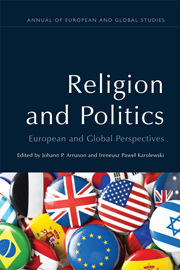Book contents
- Frontmatter
- Contents
- 1 Introduction
- 2 The Religio-political Nexus: Historical and Comparative Reflections
- 3 Politics and Religion in a Global Age
- 4 Comparative Secularisms and the Politics of Modernity
- 5 Europe in the Global Rise of Religious Nationalism
- 6 The European Union's Civil Religion in the Making?
- 7 Democracy, Secularism and Islam in Turkey
- 8 Orthodox Religion and Politics in Post-Soviet Russia
- 9 Religion and Politics, Church and State in Chinese History
- 10 Religion and the State in Contemporary Japan
- 11 Arab Revolutions and Political Islam: A Structural Approach
- 12 Beyond Post-secularism: Religion in Political Analysis (Review Article)
- Notes on the Contributors
- Index
4 - Comparative Secularisms and the Politics of Modernity
Published online by Cambridge University Press: 05 September 2014
- Frontmatter
- Contents
- 1 Introduction
- 2 The Religio-political Nexus: Historical and Comparative Reflections
- 3 Politics and Religion in a Global Age
- 4 Comparative Secularisms and the Politics of Modernity
- 5 Europe in the Global Rise of Religious Nationalism
- 6 The European Union's Civil Religion in the Making?
- 7 Democracy, Secularism and Islam in Turkey
- 8 Orthodox Religion and Politics in Post-Soviet Russia
- 9 Religion and Politics, Church and State in Chinese History
- 10 Religion and the State in Contemporary Japan
- 11 Arab Revolutions and Political Islam: A Structural Approach
- 12 Beyond Post-secularism: Religion in Political Analysis (Review Article)
- Notes on the Contributors
- Index
Summary
In mid-nineteenth-century england, George Holyoake coined the term ‘secularism’ to name an orientation to life designed to attract both theists and atheists under its banner. Impatient with positions defined in opposition to traditional Christian belief, such as atheist, infidel, or dissenter, Holyoake dreamed of a new formation, rallying around the ‘work of human improvement’, that would not be splintered by these older divisions. He sought a positive philosophy, one that was not parasitic on what was being rejected. His 1854 Principles of Secularism aspired to give voice to such an alternate vision. Its signature features were its appeal to reason, nature and experience and its passionate commitment to the amelioration of human life. Although clearly differing from forms of traditional Christianity that invoked clerical or scriptural authorities or focused on supernatural means and otherworldly ends, secularism, as Holyoake fashioned it, was not the antithesis of religion or one side of a religion–secularism binary. It was a canopy large enough to house some forms of religion as it excluded others. Its relative capaciousness was one of its defining virtues.
For Holyoake a strategic advantage of his newly coined label was the way it riffed on the term ‘secular’ in the Western Christian imaginary. Within a Christian theological framework the secular identifies the temporal and worldly in distinction from, though in relationship to, the eternal and spiritual. By appropriating a term ‘found and respected in the dictionaries of opponents’ Holyoake hoped to underscore the shared resonances.
- Type
- Chapter
- Information
- Religion and PoliticsEuropean and Global Perspectives, pp. 59 - 81Publisher: Edinburgh University PressPrint publication year: 2014



